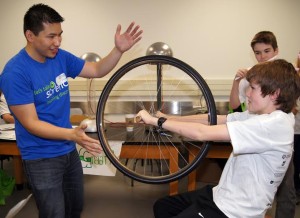Science surrounds us. It is everywhere and affects us every day.
The importance of science in our daily lives may not be immediately obvious, but if you examine your routine, you’ll find you’re regularly making science-based choices. For example, consider the food you eat (do you choose organic); products you use (do you consider their environmental impact); and health care choices you make, to name a few. Increasingly, marketing experts use science-based claims to sell products; improved science knowledge can help you make informed decisions about advertising claims.
Science and technology drive an innovative culture and are often at the core of significant political decisions. Understanding it is crucial for all Canadians so we can be informed and active in our country’s future.
As the president and founder of Let’s Talk Science, a national organization that encourages and supports children and youth engagement in science, technology, engineering and math (STEM), I understand the importance of getting children excited and interested in science and math at an early age. With a daughter going into Grade 11, who is now at the point of being able to drop science courses, I’ve also dealt with this issue firsthand.
What are the benefits of getting young children engaged in science?
“Doing science” develops our children’s ability to ask questions, collect information, organize and test ideas, problem solve, and apply what they learn. Even more, science engagement offers a powerful learning platform for building confidence, developing communication skills, and making sense of the world.
Our Let’s Talk Science Outreach program has been operating for over twenty years, and we’re now seeing students who took part in our programs when they were in elementary or high school volunteering with us as they complete their post-secondary education. Our current Let’s Talk Science Outreach coordinator at Cambrian College had that experience:
“When I was in elementary school I had attended Technology Day at Cambrian College and one of the events was CSI done by Let’s Talk Science. Leaving that day I realized I wanted to pursue science and make a difference in the world somehow,” said Brittany Belfiore, Let’s Talk Science Outreach coordinator at Cambrian College.
Getting children interested in science and math early helps nurture and grow that interest as students move through elementary into junior and senior grades. It’s essential to engage students in STEM early, make it fun and relevant to their present and future lives, and show them that STEM is a lens through which to see the world. An understanding of STEM is as important for children’s future careers as it is for their understanding of the world.
In 2013, Let’s Talk Science, with support from Amgen Canada, released our newest research report examining the importance of STEM learning. Called A Spotlight on Science Learning: the high cost of dropping science and math, the report revealed that:
• Over 70% of top jobs need STEM experience, yet fewer than half of Canadian high school students graduate with senior math and science.
• Only 22% of parents discuss math and science with their children despite realizing that these subjects are far more important now than when they were in school.
What we discovered is that far more university, college and skilled trades pathways are demanding STEM experience, from engineers and nurses to chefs, media arts specialists, welders and plumbers. However, more than 50 per cent of students are choosing to opt out of senior level biology, chemistry, and physics courses. A 2010 Angus Reid Study and a 2010 Ipsos Reid national survey revealed that student interest in science declines with age and the majority of senior secondary school students don’t see science as relevant to their future careers. The research shows that we need to revitalize children’s interest and love of science by helping them examine the diversity of options available to them when they stick with science and math.
So how do you launch the conversation with your kids? Try talking about how science and math complement your child’s personal interests and strengths. For example, if your child loves sports, talk about the importance of understanding biology for training and math for game strategy. I’ve also found it effective to highlight where science and math are needed in jobs you might not expect, for example, for skilled trades like carpentry.
A few tips for parents:
• You are the most important influencer of your child’s career choices so initiate the conversation and explore the diversity of opportunities together.
• Make science and math fun! Explore together, do experiments (see our website for activity ideas), sign-up for events and projects like the Let’s Talk Science Challenge for Grades 6-8 or Let’s Talk Science’s newest addition, Tomatosphere.
• Locate a STEM role model to shatter stereotypes about science and scientists like our Let’s Talk Science Outreach program volunteers.
• Show how science and math are relevant by highlighting the STEM in news articles or events happening in your city, province, or across Canada.
STEM learning not only prepares our kids for great jobs, it also develops the informed, thoughtful citizens we need to deal with critical issues such as climate change, energy sustainability, feeding the world, and providing potable water and health care.
The trick is not to wait – these discussions should start early in elementary school so kids can understand the value of math and science in their lives today, and in achieving their goals tomorrow.
By Bonnie Schmidt
President and Founder
Let’s Talk Science
—
Bonnie Schmidt, Ph.D., is the president and founder of Let’s Talk Science, a national charitable organization that encourages and supports children and youth in their learning of and engagement in science, technology, engineering and mathematics (STEM).
- How to Keep a Toddler Busy While Homeschooling - March 21, 2024
- 25+ Things Your Kids Learn From Video Games - March 20, 2024
- 10 Words For New Homeschoolers - March 20, 2024




